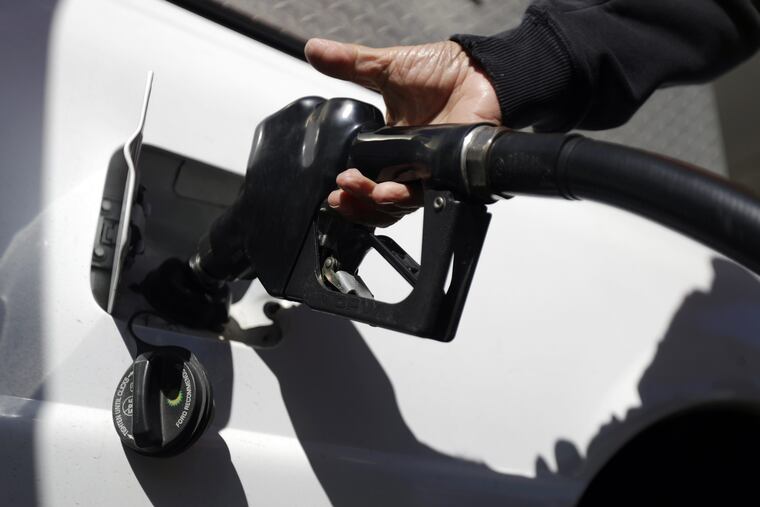Gas. Cigarettes. Booze. How do Pa. and N.J. taxes on them compare with other states’?
Excise taxes are particularly high in Pennsylvania compared with other states. And New Jersey's gas tax increased this month. Why do these types of taxes exist, and are they too high?

Motorists fueling up in New Jersey on Monday began feeling the effect of a state gas-tax increase that added 4.3 cents to the cost per gallon.
The state's total gas tax still pales in comparison to Pennsylvania's — the highest in the nation. But in both states, the fuel levy is just one of many fees that state governments have tacked on to everyday purchases.
Excise taxes — added to the purchase price of such items as gasoline, alcohol, and cigarettes — are common across the country. Lawmakers often see them as more palatable than increasing sales or income taxes, which affect all residents.
They are particularly high in Pennsylvania, which ranked 11th among states for excise-tax collections per capita, according to an analysis by the Tax Foundation, an independent nonprofit group based in Washington. Pennsylvania's reliance on so-called sin taxes has increased in recent years, through gambling expansion, increased cigarette taxes, and price hikes at state liquor stores. New Jersey, meanwhile, ranked 35th in the study, which looked at tax collections for fiscal year 2015.
How Much Are You Paying in Excise Taxes?
What excise taxes do Pennsylvania and New Jersey have?
According to data compiled by the Tax Foundation, Pennsylvania collected $714 per capita in excise taxes for fiscal year 2015, or roughly $9 billion; New Jersey was $445 per capita, or $4 billion.
Those collections included taxes on tobacco, alcohol, and gasoline, as well as public utilities, amusements, and sales taxes that apply only to certain items. Additional excise taxes apply only in Philadelphia, which has the power under state law to pass such levies as the 1.5-cents-an-ounce tax on soda and sweetened beverages and the $2-a-pack cigarette tax.
What are the pros and cons of these taxes?
Experts agree that excise taxes are valuable for funding government, but they also see issues as states grapple with how much to increase these levies, and how to balance them with other revenue sources.
Nathan Benefield, vice president and chief operating officer of the conservative Commonwealth Foundation, said excise taxes can be a useful "part of the mix" to fund state government, and are easier for legislatures to pass than state or income tax increases.
"But often that political ease leads to very high rates that have effects that distort the economy [and] distort state competition," Benefield said.
Marc Stier, director of the liberal-leaning Pennsylvania Budget and Policy Center, said excise taxes tend to hit low-income residents harder than wealthy ones.
"If you're addicted to cigarettes, you buy a pack or two a day," he said. "It's not like if you're richer, you're buying four packs a day, and if you're poorer, you're buying one pack a day."
Stier said such taxes can be justified if they discourage use of something viewed as unhealthy, such as soda; his group supports Philadelphia's tax on soda and other sweetened beverages.
Those deterrent taxes can have a backlash on revenues. Cigarette sales decrease, for example, as taxes on them rise, said Scott Drenkard, director of state projects for the Tax Foundation.
Why do gas taxes keep increasing?
Gasoline taxes are essentially user fees because they fund transportation projects. Gas taxes pay for about half of the road-improvement costs in Pennsylvania and better than two-thirds in New Jersey, Drenkard said.
Gov. Murphy has told reporters he is frustrated by the increase, but said New Jersey had no choice because the increase is tied to a formula linking it to revenue necessary to fund transportation projects.
Changes in state taxes can have an impact on whether residents cross state lines to make purchases. After New Jersey increased its gas tax in 2016, for example, AAA data documented that pumps in Pennsylvania and Delaware benefited, while New Jersey's share of gas sales in the three states declined.
"When that price advantage [in New Jersey] went away, drivers changed their gas-buying habits accordingly," Jana L. Tidwell, public and government affairs manager for AAA Mid-Atlantic, said in a news release.
Consumers hate gas-tax increases in part, Drenkard said, because it's easy to see price fluctuations.
"The prices are so prominently displayed on the gas stations," he said. "People notice even just little cent movements in prices."